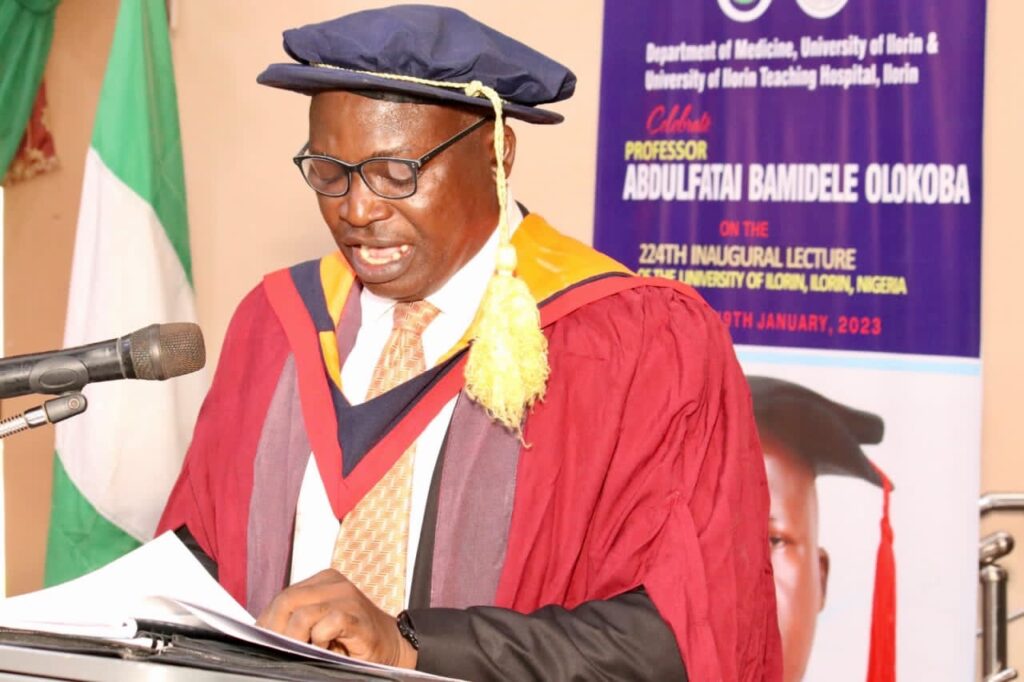A Professor of Medicine at the University of Ilorin, Abdulfatai Bamidele Olokoba, has bemoaned the dearth of Gastroenterologists and Endoscopists in Nigeria, compounded by brain drain as some of the factors warranting far less than 100 Gastrointestinal (GI) available experts to serve a population of more than 200million.
To this end, Prof. Olokoba advocated training and re-training of Gastroenterologists and Endoscopists, and funding of GI Endoscopy services, which should be need-based and adequately equipped and staffed in all the GI endoscopy centres across the country.
Prof. Olokoba stated this while delivering the 224th Inaugural Lecture of the University of Ilorin titled “Looking Through a Tube to See The World Within The Tube –Experiences and Challenges of Gastrointestinal Endoscopy in Nigeria”, held at the University Main Auditorium.
The Inaugural Lecturer identified some of the challenges bedevilling Gastrointestinal Tract endoscopy in Nigeria including among others, obsolete Endoscopy equipment, poor funding, lack of availability and accessibility of GI Endoscopy services, lack of regulation and standardization of GI Endoscopy services, and corruption.
Prof. Olokoba described Gastroenterologists and Endoscopists as medical doctors who specialise in condition that affects the organs and structures of the digestive system. These experts diagnose, treat and care for people with Functional GI disorders (e.g. abdominal pain, dysphagia, dyspepsia, diarrhoea, constipation and bloating) and structural GI disorders (strictures, stenosis, haemorrhoids, diverticular disease, colon polyps, colon cancer, colitis).
The don lamented that Gastrointestinal Endoscopy services in public and private facilities are grossly inadequate, and where available, they are not accessible due partly to the high cost of the services, and their location in urban areas.
He explained that the endoscopy equipment are very sophisticated, delicate, and expensive saying, “Available Endoscopy equipment are obsolete, and some of these break down frequently leading to Endoscopy holidays. There are maintenance issues such as the non-availability of spare parts, the non-existence of maintenance and repair centres.
Prof. Olokoba pointed out that the general corruption pervading Nigeria’s healthcare delivery system also affects GI Endoscopy services with issues such as contract inflation and mismanagement of resources. He, therefore, advocated effective management of the nation’s health care system, saying that the general under-funding of the Health sector below the 15% Abuja declaration of 2001 also affects, and partly contributes to inadequate funding of GI endoscopy services in Nigeria’s hospitals.
He recommended the use of e-learning platforms and telemedicine including videos, live streaming and live demonstrations of procedures to complement hands-on training needs, adding that manuals and guidelines should be developed and regularly updated to guide GI Endoscopy practice as is done in other climes.
He also called for the establishment of Centres of Excellence in GI endoscopy, which should be fully equipped with state-of-the-art facilities, adequately staffed, and well-funded to serve as an apex referral centre for services, training, and research.
Prof. Olokoba explained that the gastrointestinal tract (GI tract) performs several functions of which the six main ones are ingestion, motility, mechanical digestion, chemical digestion, absorption and defecation.
The distinguished medical professional, who explained that functional GI Disorders are caused by environmental factors such as stress and smoking; disorders of GI functioning, opined that the management of FGIDs is by a biopsychosocial approach involving changes in lifestyle and diet, addressing coexisting psychological comorbidity, and using medication to treat the underlying pathophysiology
The Professor of Medicine, however, identified the symptoms of common GI disorders including abdominal discomfort, unintentional weight loss, vomiting and nausea, heartburn, diarrhoea, constipation, faecal incontinence, loss of appetite, and difficulty swallowing, among others.
In the course of his career as a Professor of Medicine and Consultant Gastroenterologist and Endoscopist, Prof. Olokobastated that he contributed to the setting up of GI Endoscopy units in five hospitals across the country.
